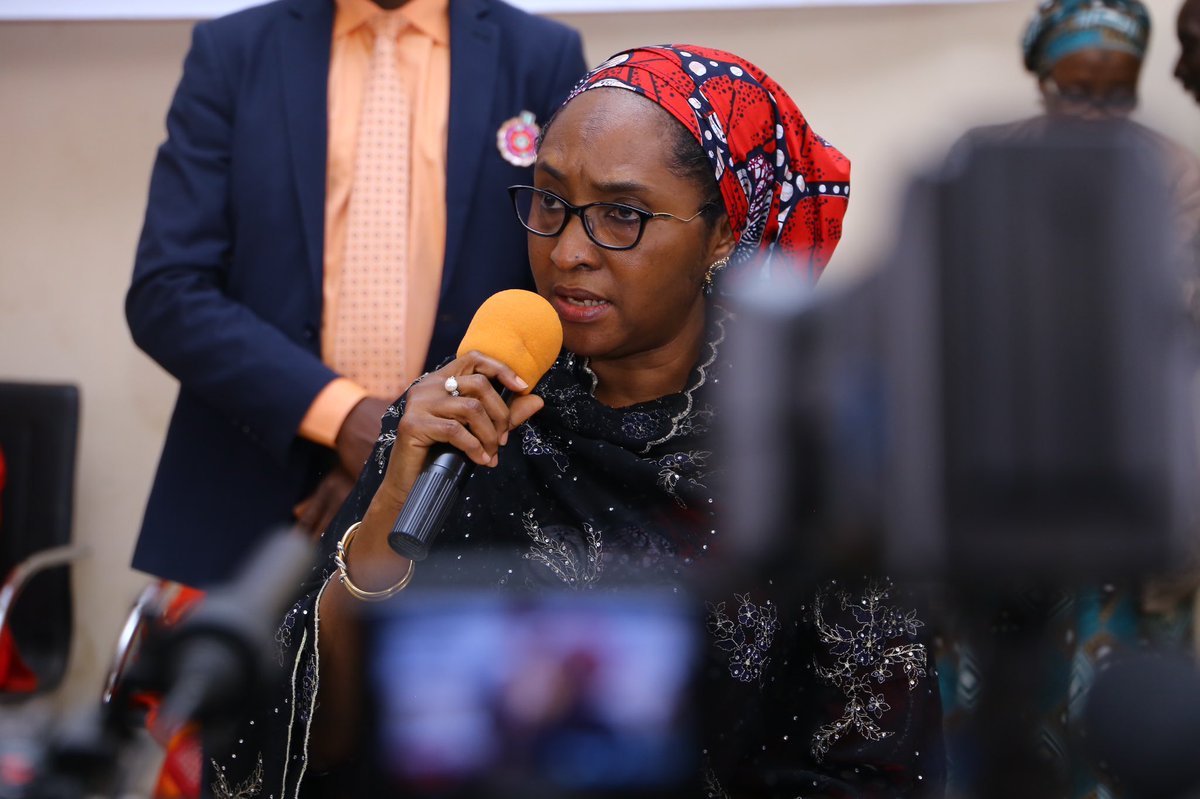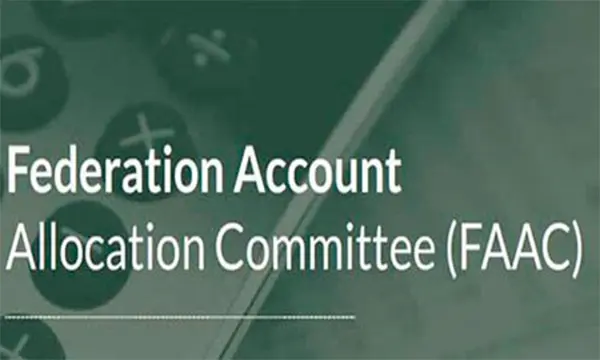Headlines
New Revenue Formula Proposes Reduction of FG’s Allocation By 3.33%, States to Increase By 3.07%

By Derrick Bangura
Speaking yesterday at the State House, Abuja, while receiving the report by the Revenue Mobilisation Allocation and Fiscal Commission (RMAFC), from its Chairman, Elias Mbam, Buhari stressed that for the nation to have a lasting review of the present revenue allocation formula, there must first be an agreement on the responsibilities to be carried out by all the tiers of Government.
In particular, he noted that the proposal seeks a 3.33% reduction in the current federal government’s allocation and on the other hand an increase of 3.07 per cent and 0.44 per cent for the states and local governments on the other hand.
He added that with regards to the Special Funds, the report by the RMAFC proposed an increase of 0.2 per cent for the Federal Capital Territory (FCT) and a decrease of 0.38 per cent for the Development of Natural Resources.
The president recounted that the federal government also made its input into the process of reviewing the vertical revenue allocation formula based on existing constitutional provisions for roles and responsibilities for the different tiers of government.
“We must note the increasing visibility in Sub-national level responsibilities due to weaknesses at that level, for example: Primary Health Care; Basic Primary Education; Levels of insecurity, and; Increased remittances to State and Local Governments through the Value Added Tax sharing formula, where the Federal Government has only 15 per cent and the States and Local Government share 50 per cent and 35 per cent respectively”.
Buhari said he would have gone ahead to present the revenue allocation report to the National Assembly as a Bill for enactment.
He, however, explained that since the review of the vertical revenue allocation formula was a function of the roles and responsibilities of the different tiers of government, “I will await the final outcome of the constitutional review process, especially as some of the proposed amendments would have a bearing on the recommendations contained herein.”
He listed some of the recommendations in the report to include: ‘‘Establishing local government as a tier of government and the associated abrogation of the state/local government account; moving airports; fingerprints, identification and criminal records from the exclusive legislative list to the concurrent legislative list, empowering the RMAFC to enforce compliance with remittance of accruals into and disbursement of revenue from the Federation Account as well as streamlining the procedure for reviewing the revenue allocation formula.’’
The president assured members of the Commission that the federal government would immediately subject the report to its internal review and approval processes, while awaiting finalisation of the efforts by the National Assembly.
According to him, this strategy, rather than issuing an Executive Modification order, as was done in 1992, was more in line with entrenching our democratic tenets.
He commended the RMAFC for a job painstakingly done, pledging his unwavering commitment and support to them in carrying out their constitutional mandates.
The president also thanked Nigerians, especially the state and local governments, for making their inputs through the broad stake-holder engagement processes that produced the report.
‘‘I am aware that the present revenue allocation formula has not been reviewed since the last exercise carried out in 1992.
‘‘Considering the changing dynamics of our political-economy, such as privatisation, deregulation, funding arrangement of primary education, primary health care and the growing clamour for decentralisation among others; it is necessary that we take another look at our Revenue Sharing Formula, especially the vertical aspects that relate to the tiers of government.
‘‘This becomes more compelling as we need to reduce our infrastructural deficit, make more resources available for tackling insecurity, confront climate change and its associated global warming and make life more meaningful for our rapid growing population.’’
Buhari said as an advocate for grassroots development, he has always remained committed to ensuring that all tiers of Government are treated fairly, equally and justly in the sharing of national resources.
‘‘I want to let you all know that I have keenly followed most of the discussions held in the geo-political consultative process and one thing that struck me clearly was the agreement that a review of our vertical revenue formula cannot and should not be an emotional or sentimental discussion and it cannot be done arbitrarily.
‘‘All over the world, revenue and resource allocation have always been a function of the level of responsibilities attached to the different components or tiers of government.
‘‘I am, therefore, happy to note that the discussions were held along these lines and rested squarely on roles and responsibilities as spelt out in the 1999 Constitution (as amended).
‘‘However, I also note that in reaching the final decisions at most of these engagements, not much emphasis was placed on the fact that the Second Schedule of the Nigerian constitution contains 68 items on the Exclusive Legislative List and the remaining 30 items on the Concurrent List requiring both the Federal and State Government to address.”
Earlier in his remarks, the Secretary to the Government of the Federation, Boss Mustapha, said the RMAFC followed due process in undertaking the exercise, and sought the opinion of the federal government before finalising the report.
Giving a synopsis of the report, Mustapha said it was in four volumes, including a summary in the main report.
He added: ‘‘Volume 1 contains the various memoranda submitted by the Federal and State Governments as well as the FCT. Volume 2 details the presentation from the academia, civil society, professional bodies, traditional rulers, individuals, as well as women and youth council.
‘‘To complete the inclusiveness of the stakeholder participatory processes adopted, Volume 3 is a research that captures the body of knowledge that supported the review while Volume 4 is a further distillation of submissions by the State and Local Governments as well as NGOs and Area Councils of the FCT.”
Also speaking, RMAFC Chairman Mbam said the leading philosophy behind the proposed review was guided by the need for distributive justice, equity and fairness as enshrined in relevant Sections of the 1999 Constitution (as amended).
He added that the principles took into cognisance the indivisibility of the country, public opinion and weighted Constitutional responsibilities and functions of the three levels of Government.
He announced that the proposed vertical revenue allocation formula advised 45.17 per cent for the federal government, 29.79 per cent for state governments and 21.04 per cent for the local governments.
Under Special Funds, he said, the Report by the Commission recommended one per cent for Ecology, 0.5 per cent for Stabilisation, 1.3 per cent for Development of Natural Resources and 1.2 per cent for the FCT.
In arriving at the new vertical revenue allocation formula, Mbam told the president that the Commission had wide consultation with major stakeholders, public hearing in all the geo-political zones, administered questionnaires and studied some other federations with similar fiscal arrangements like Nigeria to draw useful lessons from their experiences.
According to the RMAFC chairman, the Commission also visited all the 36 States and the FCT, the 774 local government areas to sensitise and obtain inputs from stakeholders.
He added that literature reviews were conducted on revenue allocation formula in Nigeria dating back to pre-independence period while the Commission received memoranda from the public sectors, individuals and private institutions across the country.
Explaining the major reasons for the exercise, Mbam noted that since the last review was conducted in 1992, 29 years ago, the political structure of the country has changed with the creation of six additional States in 1996, which brought the number of States to 36.
Correspondingly, he said, the number of local governments councils also increased from 589 to 774.
‘‘There have been considerable changes arising from the policy reforms that altered the relative share of responsibilities of the various tiers of government such as deregulation, privatisation and the lingering controversies over funding of primary education, primary healthcare.”
The RMAFC chairman noted that while Section 32(b), Part 1 of Third Schedule of the 1999 Constitution 9 (as amended) empowers the Commission to review from time to time the revenue allocation formulae; the inadequate and decaying infrastructure, as well as heightened widespread internal security challenges across the country also necessitated the exercise, among others.
Headlines
Noble Ladies Champion Women’s Financial Independence at Grand Inauguration in Abuja

Women from diverse backgrounds across Nigeria and beyond gathered at the Art and Culture Auditorium, Abuja, for the inauguration and convention of the Noble Ladies Association. The event, led by the association’s Founder and “visionary and polished Queen Mother,” Mrs. Margaret Chigozie Mkpuma, was a colourful display of feminine elegance, empowerment, and ambition.
The highly anticipated gathering, attended by over 700 members and counting, reflected the association’s mission to help women realise their potential while shifting mindsets away from dependency and over-glamorization of the ‘white collar job.’ According to the group, progress can be better achieved through innovation and creativity. “When a woman is able to earn and blossom on her own she has no reason to look at herself as a second fiddle,” the association stated.
One of the association’s standout initiatives is its women-only investment platform, which currently offers a minimum entry of ₦100,000 with a return of ₦130,000 over 30 days—an interest rate of 30 percent. Some members invest as much as ₦1 million, enjoying the same return rate. Mrs. Mkpuma explained that the scheme focuses on women because “women bear the greater brunt of poverty” and the platform seeks “to offer equity in the absence of economic equality.”
Education is also central to the Noble Ladies’ mission, regardless of age. Their mantra, “start again from where you stopped,” encourages women to return to school or upgrade their skills at any stage in life. The association believes that financial stability is vital in protecting women from cultural practices that dispossess widows of their late husbands’ assets, while also enabling them to raise morally and socially grounded families.
Founded on the vision of enhancing women’s skills and achieving financial stability, the association rests on a value system that discourages pity and promotes purpose. “You have a purpose and you build on that purpose to achieve great potentials and emancipation,” Mrs. Mkpuma said.
A criminologist by training and entrepreneur by practice, she cautions against idleness while waiting for formal employment. “There are billions in the informal and non-formal sectors waiting to be made,” she said, rejecting the “new normal of begging” and urging people to “be more introspective to find their purpose in life and hold on to it.”
Mrs. Mkpuma’s management style keeps members actively engaged, focusing on vocational skills and training to prepare them for competitive markets. She is exploring “innovative integration of uncommon technologies” and is already in talks with international franchises to invest in Nigeria, with Noble Ladies as first beneficiaries.
The association’s core values include mutual respect, innovation, forward-thinking, equal opportunity, and financial emancipation. With plans underway to establish a secretariat in the heart of Abuja, the group aims to expand its impact.
The event drew high-profile guests, including former Inspector General of Police, Mike Okiro, and a host of VIPs, marking a significant milestone in the association’s drive for women’s empowerment.
Headlines
NEPZA, FCT agree to create world-class FTZ environment

The Nigeria Export Processing Zones Authority (NEPZA) has stepped in to resolve the dispute between the Federal Capital Territory Administration and the Abuja Technology Village (ATV), a licensed Free Trade Zone, over the potential revocation of the zone’s land title.
Dr. Olufemi Ogunyemi, the Managing Director of NEPZA, urged ATV operators and investors to withdraw the lawsuit filed against the FCT administration immediately to facilitate a roundtable negotiation.
Dr. Ogunyemi delivered the charge during a courtesy visit to the Minister of the Federal Capital Territory, Barrister Nyesom Wike, on Thursday in Abuja.
You will recall that the ATV operators responded to the revocation notice issued by the FCT administration with a lawsuit.
Dr. Ogunyemi stated that the continued support for the growth of the Free Trade Zones Scheme would benefit the nation’s economy and the FCT’s development, emphasizing that the FCT administration recognized the scheme’s potential to accelerate industrialisation.
Dr. Ogunyemi, also the Chief Executive Officer of NEPZA, expressed his delight at the steps taken by the FCT minister to expand the economic frontier of the FCT through the proposed Abuja City Walk (ACW) project.
Dr. Ogunyemi further explained that the Authority was preparing to assess all the 63 licensed Free Trade Zones across the country with the view to vetting their functionality and contributions to the nation’s Foreign Direct Investment and export drives.
“I have come to discuss with His Excellency, the Minister of the Federal Capital Territory on the importance of supporting the ATV to succeed while also promoting the development of the Abuja City Walk project. We must work together to achieve this for the good of our nation,” he said.
On his part, the FCT Minister reiterated his unflinching determination to work towards President Bola Ahmed Tinubu’s Renewed Hope Agenda by bringing FDI to the FCT.
“We must fulfil Mr. President’s promises regarding industrialization, trade, and investment. In this context, the FCT will collaborate with NEPZA to review the future of ATV, a zone that was sponsored and supported by the FCT administration,” Wike said.
Barrister Wike also said that efforts were underway to fast-track the industrialisation process of the territory with the construction of the Abuja City Walk.
The minister further said the Abuja City Walk project was planned to cover over 200 hectares in the Abuja Technology Village corridor along Airport Road.
According to him, the business ecosystem aimed to create a lively, mixed-use urban center with residential, commercial, retail, hospitality, medical, and institutional facilities.
He added that the ACW would turn out to be a high-definition and world-class project that would give this administration’s Renewed Hope Agenda true meaning in the North-Central Region of the country.
Barrister Wike also indicated his continued pursuit of land and property owners who failed to fulfil their obligations to the FCT in his determination to develop the territory.
Headlines
Benue IDPs block highway, demand return to ancestral homes

Vehicular movement along the Yelwata axis of the Benue–Nasarawa highway was brought to a standstill on Wednesday as Internally Displaced Persons, IDPs, staged a protest, demanding immediate return to their ancestral homes.
The protesters, believed to be victims of persistent attacks by suspected herdsmen, blocked both lanes of the busy highway for several hours, chanting “We want to go back home”.
The protest caused disruption, leaving hundreds of motorists and passengers stranded.
Eyewitnesses said the displaced persons, many of whom have spent years in overcrowded IDP camps, are expressing deep frustration over the government’s delay in restoring security to their communities.
“We have suffered enough. We want to return to our homes and farms,” one of the protesters told reporters at the scene.
Security personnel were reportedly deployed to monitor the situation and prevent any escalation, though tensions remained high as of press time.
Efforts to reach the Benue State Emergency Management Agency, SEMA, and other relevant authorities for comment were unsuccessful.
-

 Headlines4 years ago
Headlines4 years agoFacebook, Instagram Temporarily Allow Posts on Ukraine War Calling for Violence Against Invading Russians or Putin’s Death
-

 Headlines4 years ago
Headlines4 years agoNigeria, Other West African Countries Facing Worst Food Crisis in 10 Years, Aid Groups Say
-

 Foreign4 years ago
Foreign4 years agoNew York Consulate installs machines for 10-year passport
-

 News1 year ago
News1 year agoZero Trust Architecture in a Remote World: Securing the New Normal
-

 Entertainment3 years ago
Entertainment3 years agoPhyna emerges winner of Big Brother Naija Season 7
-

 Headlines2 years ago
Headlines2 years agoNigeria Customs modernisation project to check extortion of traders
-

 Entertainment2 years ago
Entertainment2 years agoMovie download platform, Netnaija, announces closure
-

 Economy2 years ago
Economy2 years agoWe generated N30.2 bn revenue in three months – Kano NCS Comptroller














